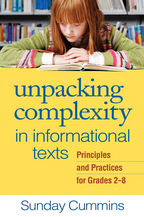Unpacking Complexity in Informational Texts
Principles and Practices for Grades 2-8
Sunday Cummins
Foreword by Elfrieda H. Hiebert
HardcoverPaperbacke-bookprint + e-book
Hardcover
orderNovember 11, 2014
ISBN 9781462518593
Price: $48.00 147 Pages
Size: 7" x 10"
Paperback
orderNovember 12, 2014
ISBN 9781462518500
Price: $32.00147 Pages
Size: 7" x 10"
See related items for this product
Ideal for Professional Development
Includes Common Core Content
Includes Common Core Content
To acquire content knowledge through reading, students must understand the complex components and diverse purposes of informational texts, as emphasized in the Common Core State Standards (CCSS). This practical book illuminates the ways in which a text’s purpose, structure, details, connective language, and construction of themes combine to create meaning. Classroom-tested instructional recommendations and “kid-friendly” explanations guide teachers in helping students to identify and understand the role of these elements in different types of informational texts. Numerous student work samples, excerpts from exemplary books and articles, and a Study Guide with discussion questions and activities for professional learning add to the book’s utility.
“This rich resource provides robust illustrations of how to teach students to read complex informational texts. This is accomplished through the use of mentor sentences and excerpts from a wide variety of children’s and young adult nonfiction. The book goes beyond simplistic notions of text structure while guiding teachers to assist students to read nonfiction more powerfully.”
—Jeffrey D. Wilhelm, PhD, Distinguished Professor, Boise State University
“Cummins’s previous book, Close Reading of Informational Texts, expanded my understanding of the art of reading nonfiction and was a perfect fit for our school’s professional learning community. Unpacking Complexity in Informational Texts book extends our thinking by examining the various structures that are used in informational writing and why these are important to readers. Using her own classroom experience, Cummins shows the value of exploring text structure with students to help them comprehend the author’s purpose. The book is rich with examples of informational texts, making it easy to use Cummins's instructional ideas directly in the classroom. It provides wonderful suggestions for both new and seasoned educators. A ‘must read’!”
—Joanne Toft, MA, literacy and educational consultant and former classroom teacher, Minneapolis, Minnesota
“This is a valuable guide for teachers in grades 2-8, academic coaches, site administrators, and curriculum directors implementing the CCSS to increase the rigor and level of reading in all content areas. Instructional strategies, sample lessons, anchor charts, examples of student work, and interactive templates are offered in each chapter. Teachers and those engaging in professional development can use this book to support their efforts to plan lessons that require students to engage with texts, think critically, discuss their understanding, and write about information embedded in complex informational texts.”
—Lori Greenwood, MA, Educational Leadership Director of Curriculum, Instruction, and Special Education, Plumas Lake (California) Elementary School District
“This is a terrific book for classroom teachers, literacy leaders, and teacher educators. Taking a comprehensive look at different aspects of text complexity, Cummins deepens our understanding of how informational texts work. Her conversational tone and abundant examples make for an accessible read, and the Study Guide makes this an ideal resource for a teacher study group or for professional development. The book would also be useful in advanced undergraduate or master's-level literacy courses. Readers will gain in-depth knowledge about text complexity, as well as concrete ideas for helping young readers gain full access to complex informational texts.”
—Juliet L. Halladay, PhD, Department of Education, University of Vermont
“Cummins gives teachers a practical look at the parts of a complex text. Her instructional recommendations support students in developing language to navigate, discuss, and write about these rigorous texts, as well as determine how the text's components work together to construct the main idea. This book will be a tremendous resource in professional learning communities. It will encourage teachers to reflect on their teaching practices and consider what students need in order to achieve a better understanding of complex informational texts.”
—Christina Ensign, MA, NBCT, Reading Specialist, Peter M. Gombert Elementary School, Aurora, Illinois
Table of Contents
Introduction. The Issue of Informational Text Complexity1. What Do We Mean by Text Complexity?
2. What Makes an Informational Text Complex?
3. What Do We Mean by an Author’s Purpose?
4. What Do We Mean by a Text’s Structure?
5. What Types of Details Are in Non-Narrative Texts?
6. What Types of Details Are in Narrative Texts?
7. Why Pay Attention to Connective Language?
8. How Are Main Ideas Constructed?
Closing Thoughts
Appendix. Study Guide
